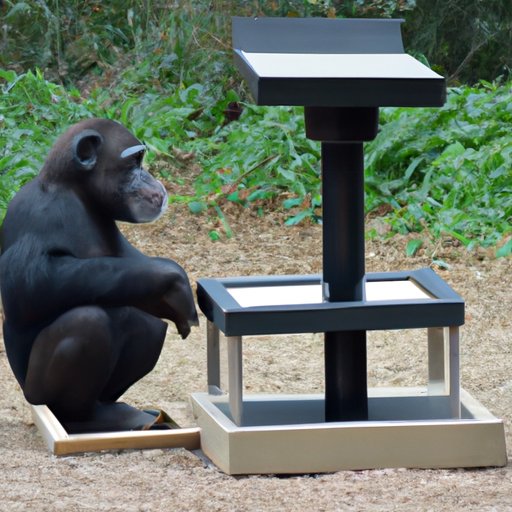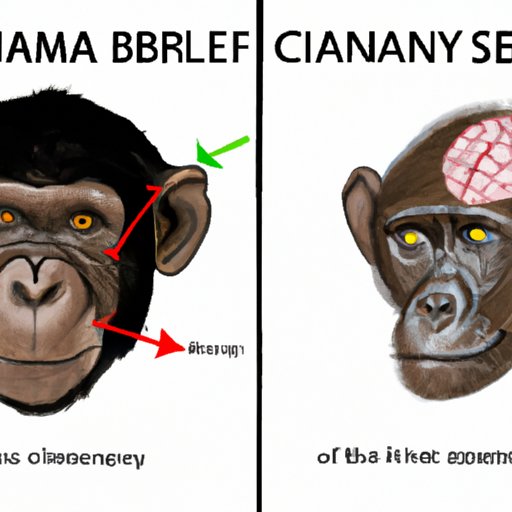Introduction
Are you smarter than a chimpanzee? It’s a question that has been debated for centuries, with scientists and researchers struggling to understand the cognitive differences between humans and our closest living relatives. In this article, we will take a closer look at the current evidence to explore the answer to this age-old question.
Definition of the Problem
The primary focus of this article is to examine the cognitive differences between humans and chimpanzees. We will look at various tests used to measure chimpanzee intelligence, compare brain structures, and investigate language and communication skills. By doing so, we can gain an understanding of the cognitive abilities of chimpanzees and make comparisons to human capabilities.
Overview of the Cognitive Differences Between Chimpanzees and Humans
Before we dive deeper into the topic, it is important to note that chimpanzees are highly intelligent animals. They are capable of solving complex problems, using tools, and learning from experience. However, their cognitive abilities are limited in comparison to humans. Studies have shown that humans possess more advanced problem-solving skills, greater capacity for abstract thought, and a larger range of emotions.

Exploring the Tests Used to Measure Chimpanzee Intelligence
Researchers use a variety of tests to measure chimpanzee intelligence. These tests involve tasks such as recognizing patterns, solving puzzles, and memorizing sequences. The results of these tests can provide insight into the cognitive abilities of chimpanzees and help us compare their intelligence to that of humans.
What Tests Reveal About Chimpanzee Intelligence?
Studies have found that chimpanzees possess some impressive intellectual abilities. For example, they are capable of learning and remembering information, understanding cause and effect relationships, and developing strategies to solve problems. They also demonstrate advanced social behavior, including cooperation and empathy.
Examining Chimpanzee Behavior in Captivity
It is important to note that captive chimpanzees often demonstrate different behaviors than those observed in the wild. This is due to the fact that captive chimpanzees are exposed to different environmental conditions and may be influenced by the presence of humans. As such, it is difficult to accurately assess the cognitive abilities of chimpanzees when they are in captivity.

Comparing Chimpanzee and Human Brain Structures
Another way to compare chimpanzee and human intelligence is to look at the differences in brain structure. Studies have found that the two species have distinct anatomical differences in the prefrontal cortex, a region of the brain associated with higher-level thinking and decision-making. Chimpanzees also have a smaller hippocampus, which is involved in memory and learning.

Investigating the Structural Differences Between Chimpanzees and Humans
The structural differences between the brains of chimpanzees and humans can help explain why humans are able to think in more abstract ways and engage in complex problem-solving. For example, humans have a larger prefrontal cortex, which is associated with executive functions such as planning, organizing, and making decisions. Additionally, humans have a larger hippocampus, which is involved in memory formation and recall.
Analyzing the Impact of Environment on Chimpanzee Intelligence
It is important to note that the environment can have a significant impact on the cognitive abilities of chimpanzees. Studies have shown that chimpanzees raised in enriched environments, with access to toys and other stimuli, can perform better on cognitive tests than those raised in deprived environments. This suggests that providing chimpanzees with stimulating activities can help them develop their intellectual capabilities.

Investigating Chimpanzee Language and Communication Skills
Chimpanzees are capable of communicating with each other using vocalizations and gestures. Studies have found that chimpanzees can recognize and remember the calls of other individuals, as well as respond to these calls in appropriate ways. They are also able to use gestures to communicate with one another and coordinate their movements.
How Chimpanzees Communicate With Each Other
Chimpanzees use a variety of vocalizations and gestures to communicate with one another. They are capable of producing more than 60 distinct vocalizations, which can convey different messages depending on the context. For example, chimpanzees can use “pant hoots” to signal alarm or excitement, and “contact barks” to reunite with family members. Additionally, chimpanzees use gestures such as pointing and touching to communicate with one another.
Examining the Limitations of Chimpanzee Language
While chimpanzees are capable of producing and understanding a variety of vocalizations and gestures, their language skills are limited in comparison to humans. Studies have found that chimpanzees lack the ability to form complex sentences, use abstract symbols, or engage in symbolic thought. Additionally, they are unable to comprehend the meaning of words or use language in a creative way.
Conclusion
In conclusion, it is clear that there are significant differences between the cognitive abilities of chimpanzees and humans. While chimpanzees are capable of solving complex problems and learning from experience, their language and communication skills are limited in comparison to humans. Additionally, their brain structures differ from those of humans, which may explain why humans possess more advanced problem-solving skills, greater capacity for abstract thought, and a larger range of emotions.
Summary of Findings
This article explored the cognitive differences between humans and chimpanzees by examining tests used to measure chimpanzee intelligence, comparing brain structures, and investigating language and communication skills. We found that chimpanzees possess some impressive intellectual abilities, but their cognitive abilities are limited in comparison to humans. Additionally, their brain structures differ from those of humans, which may explain why humans possess more advanced problem-solving skills, greater capacity for abstract thought, and a larger range of emotions.
Final Thoughts on the Cognitive Differences Between Chimpanzees and Humans
Understanding the cognitive differences between humans and chimpanzees can help us gain insight into both species’ capabilities. It can also help us appreciate the unique capabilities of humans, while recognizing the impressive intelligence of chimpanzees. Ultimately, it is clear that while chimpanzees possess some impressive cognitive abilities, humans remain the most intelligent species on earth.
(Note: Is this article not meeting your expectations? Do you have knowledge or insights to share? Unlock new opportunities and expand your reach by joining our authors team. Click Registration to join us and share your expertise with our readers.)
